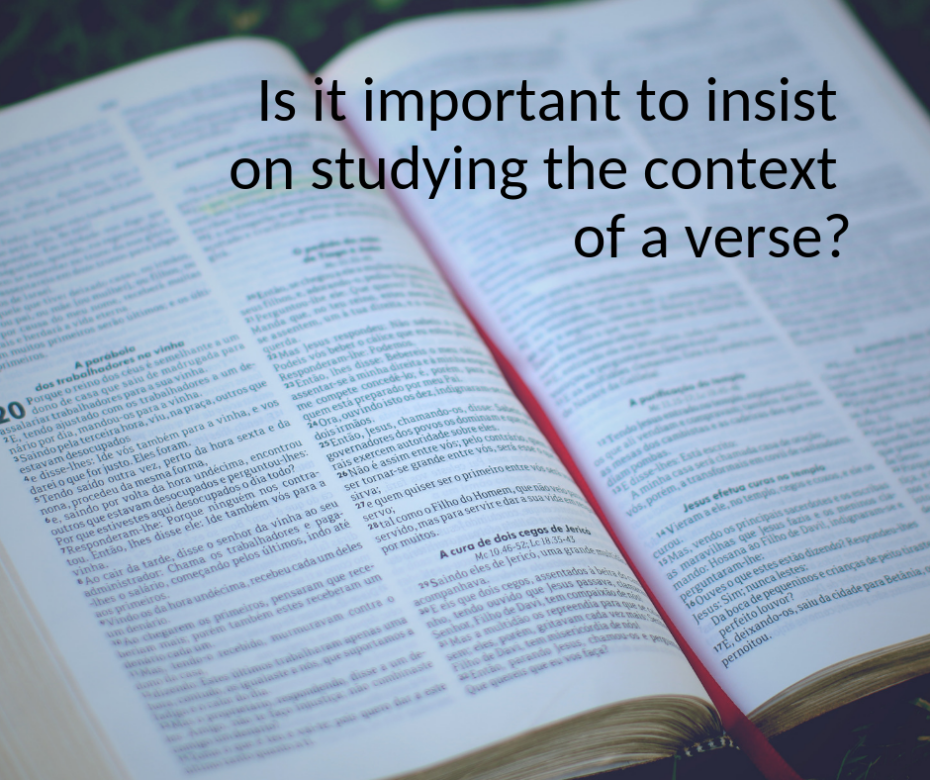One of the emphases of Free Grace Theology is its insistence on looking at the context of a verse when we study it. Hopefully, we challenge ourselves and others by the light that the context sheds on the verse. As a result, we often find ourselves changing views we previously held and invite others to look at their traditional understanding as well.
But sometimes we encounter opposition. Such a practice can be seen as causing division and as unloving. If good and sincere people see a verse in one way and they are doing the work of the Lord, why point out that the way they understand certain things are misguided? Such exercises only cause divisions.
Recently, I attended a church meeting where a missionary organization was telling the congregation about its ministry. It involved a slide show in which the number of people in each continent that have not heard the gospel was presented. I don’t remember the exact numbers, but it was in the billions. The point was that billions of people in this world have never heard the gospel.
The organization pointed out the importance of their ministry. We should support missionaries to reach all these people. He was asking for the church members to give to his organization to help to achieve this goal. It seemed to me that the president of this organization was sincere and wanted to take the Word of God to people around the world.
In order to drive home how important it was for us to give to his organization, he placed a verse on the screen. It was Matthew 24:14. It occurs in the Olivet Discourse. The Lord says: “And this gospel of the kingdom will be preached in all the world as a witness to all the nations, and then the end will come.” The president said, based upon this verse, that Jesus will not come until all the billions of people who have not heard the gospel hear it. There are many countries where there are no gospel-preaching missionaries.
One could say that this is a good thing. It might motivate people to give to missions. It might even get them excited that they are doing their part in paving the way for the Lord to return.
But there are many problems with this message. It completely ignores the context. In Matthew 24:14 Jesus is talking about the Great Tribulation, as even a casual reading of the next verses shows (Matt 24:15-29). Jesus is saying that in the Tribulation the gospel will be preached around the world, before His Second Coming (Matt 24:30). But the coming of the Lord for the Church in the rapture would have already occurred seven years earlier.
I don’t know if the president of this organization believed in the rapture. I believe he did. If he did he was telling us that the rapture of the church would not occur in the next 10 years (?) or so because we had much work to do on the mission field. If he didn’t believe in the rapture he was saying that the Lord will not put an end to the world for years to come. Either way his point was this: The Lord was not coming for years because of our indifference towards missions.
If we assume that this man was sincere and was not simply looking for money for his organization, is there a problem with his interpretation of Matt 24:14? Is it important to point out the context? Is it promoting division to do so?
I think it is important to point out the error of his interpretation. One of the major points of the Olivet Discourse is that believers would eagerly await the coming of the Lord. He could come back at any moment (Matt 24:36, 42). What the president of the organization was saying was that there was no need to be looking for the Lord. He wouldn’t be coming for a number of years. The president turned the teaching of the Lord upside down.
In other words, by not looking at the context we run the danger of completely missing the point of the Lord. He taught us to be looking for Him. If we don’t look at the context we go away saying: there is no need to look for Him to come today.
Is it really important to use the context to challenge the sincerely held views that we or others have? Can’t such an exercise be seen as an attack on people who are doing the work of the Lord?
The more important question is: Do we want to accurately proclaim what the Scriptures teach? If we do, we must continually look at the context of the passages we are studying, even if it challenges what we believe or what others say.


